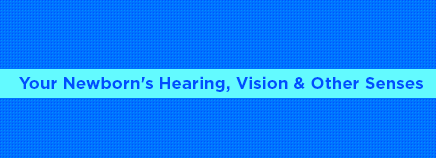
Your newborn may seem to do little more than eat, sleep, cry, pee, and poop. But if you notice how your baby reacts to things like light, noise, and touch, you will see the senses hard at work.
What Can My Baby See?
Your baby sees things best from 8 to 12 inches away. This is the perfect distance for gazing up into the eyes of mom or dad (a favorite thing to do!). Any farther than that, and newborns see mostly blurry shapes because they’re nearsighted. At birth, a newborn’s eyesight is between 20/200 and 20/400.
Their eyes are sensitive to bright light, so they’re more likely to open their eyes in low light. Don’t worry if your baby’s eyes sometimes cross or drift outward (go “wall-eyed”). This is normal until your baby’s vision improves and eye muscles strengthen.
Give your baby lots of appealing things to look at. After human faces, bright colors, contrasting patterns, and movement are the things newborns like to look at most. Black-and-white pictures or toys will keep your baby’s interest longer than objects or pictures with lots of similar colors.
When quiet and alert, your baby should be able to follow the slow movement of your face or an object.
What Can My Baby Hear?
Your newborn has been hearing sounds since way back in the womb. Mother’s heartbeat, the gurgles of her digestive system, and even the sounds of her voice and the voices of other family members are part of a baby’s world before birth.
Once your baby is born, the sounds of the outside world come in loud and clear. Your baby may startle at the unexpected bark of a dog nearby or seem soothed by the gentle whirring of the clothes dryer or the hum of the vacuum cleaner.
Notice how your newborn responds to your voice. Human voices, especially mom’s and dad’s, are a baby’s favorite “music.” Your baby already knows that this is where food, warmth, and touch come from. If your baby is crying in the bassinet, see how quickly your approaching voice quiets him or her down. See how closely your baby listens when you are talking or singing in loving tones.
Most newborns have a hearing screening before being released from the hospital (most states require this). If your baby didn’t have it, or was born at home or a birthing center, it’s important to have a hearing screening within the first month of life. Most babies born with a hearing loss can be diagnosed through a hearing screening.
Can My Baby Taste or Smell?
Newborns can taste and smell and will favor sweet tastes over bitter ones. For example, a newborn will choose to suck on a bottle of sweetened water, but will turn away or cry if given something bitter or sour to taste. Likewise, newborns will turn toward smells they favor and turn away from bad odors.
Though sweetness is preferred, taste preferences will continue to develop during the first year of life. In fact, studies show that a mother’s diet can affect the way her breast milk tastes. These first flavors can help shape flavor preferences later on. For example, a mother who ate spicy foods while nursing is likely to have a child who grows up to favor spicy foods.
For now, breast milk or formula will fully satisfy your baby.
Why Is Touch Important?
Touch is very important to a newborn. With each touch, your newborn is learning about life and its surroundings.
While in the womb, babies are kept warm and protected, but after birth they are faced with feeling cold for the first time, brushing up against the hardness of the crib, or feeling the stiff edge of a seam inside clothes. Be sure that your newborn finds the world a soothing place to be by providing lots of soft clothes and blankets, tender kisses, comforting hugs, and loving caresses.
Should I Be Worried?
If you want reassurance that your baby’s senses are working well, you can do some unscientific testing for yourself.
When quiet and alert without other distractions, will your baby look at your face or a toy? If your baby’s eyes seem to cross more than just briefly, be sure to tell your doctor. Also tell the doctor if your baby’s eyes appear cloudy or filmy, or if you notice unusual eye movements.
Most newborns will startle if surprised by a loud noise nearby. Other ways to rest assured your baby is hearing well: Does your baby calm down when he or she hears your voice? Does your baby turn to the sound of a rattle? Does your baby react to soft lullabies or other music?
Even if your child passed the newborn hearing screen, talk to your doctor if you have concerns about your baby’s hearing. The sooner a potential problem is caught, the better it can be treated.

